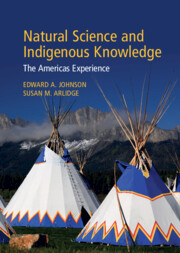Book contents
- Natural Science and Indigenous Knowledge
- Natural Science and Indigenous Knowledge
- Copyright page
- Contents
- Contributors
- Preface
- 1 What Do Indigenous People Have to Tell Us about the Cultural Landscapes They Have Created?
- 2 Reintegrating Cultural and Natural Landscapes
- 3 “My Uncle Was Resting His Country”: Dene Kinship and Insights into the More Distant Past
- 4 Native American Science in a Living Universe: A Paiute Perspective
- 5 “To Get More Harvest”
- 6 Hunting and Trapping in the Americas: The Assessment and Projection of Harvest on Wildlife Populations
- 7 On Fire and Water: The Intersection of Wetlands and Burning Strategies in Managing the Anthropogenic Plant Communities of Yosemite National Park
- 8 Indigenous Knowledge and the Kindergarten to Twelfth-Grade Science Classroom
- Index
- References
8 - Indigenous Knowledge and the Kindergarten to Twelfth-Grade Science Classroom
Published online by Cambridge University Press: 11 April 2024
- Natural Science and Indigenous Knowledge
- Natural Science and Indigenous Knowledge
- Copyright page
- Contents
- Contributors
- Preface
- 1 What Do Indigenous People Have to Tell Us about the Cultural Landscapes They Have Created?
- 2 Reintegrating Cultural and Natural Landscapes
- 3 “My Uncle Was Resting His Country”: Dene Kinship and Insights into the More Distant Past
- 4 Native American Science in a Living Universe: A Paiute Perspective
- 5 “To Get More Harvest”
- 6 Hunting and Trapping in the Americas: The Assessment and Projection of Harvest on Wildlife Populations
- 7 On Fire and Water: The Intersection of Wetlands and Burning Strategies in Managing the Anthropogenic Plant Communities of Yosemite National Park
- 8 Indigenous Knowledge and the Kindergarten to Twelfth-Grade Science Classroom
- Index
- References
Summary
Indigenous students live between two worldviews of how the natural world works – the world of traditional knowledge and the world of science. The common denominator is the land. In this chapter, I outline some of the challenges in matching best pedagogy within the cultures of schools, science, traditional Indigenous knowledge, and teaching on the land. How can schools build relationships with local Indigenous knowledge keepers to develop a culturally responsive science curriculum? How can we support knowledge keepers and teachers to provide land-based science lessons in the context of a typical school? How do we prepare teachers in active learning and inquiry methods to match traditional ways of teaching? And how do we do this all while on the land?
Keywords
- Type
- Chapter
- Information
- Natural Science and Indigenous KnowledgeThe Americas Experience, pp. 233 - 269Publisher: Cambridge University PressPrint publication year: 2024

